一般疑问句
一般疑问句(语法)
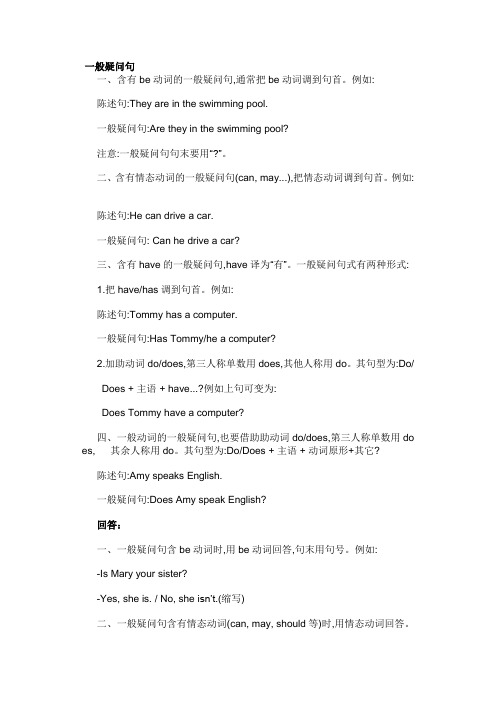
一般疑问句一、含有be动词的一般疑问句,通常把be动词调到句首。
例如:陈述句:They are in the swimming pool.一般疑问句:Are they in the swimming pool?注意:一般疑问句句末要用“?”。
二、含有情态动词的一般疑问句(can, may...),把情态动词调到句首。
例如:陈述句:He can drive a car.一般疑问句: Can he drive a car?三、含有have的一般疑问句,have译为“有”。
一般疑问句式有两种形式:1.把have/has调到句首。
例如:陈述句:Tommy has a computer.一般疑问句:Has Tommy/he a computer?2.加助动词do/does,第三人称单数用does,其他人称用do。
其句型为:Do/Does + 主语 + have...?例如上句可变为:Does Tommy have a computer?四、一般动词的一般疑问句,也要借助助动词do/does,第三人称单数用do es, 其余人称用do。
其句型为:Do/Does + 主语 + 动词原形+其它?陈述句:Amy speaks English.一般疑问句:Does Amy speak English?回答:一、一般疑问句含be动词时,用be动词回答,句末用句号。
例如:-Is Mary your sister?-Yes, she is. / No, she isn’t.(缩写)二、一般疑问句含有情态动词(can, may, should等)时,用情态动词回答。
例如:-May I come in?-Yes, you may. / No, you can’t.三、一般疑问句含有have(译为“有”)时,有两种回答方式。
1.直接用have/has回答。
例如:-Have they any pictures?-Yes, they have. / No, they haven’t.2.用助动词do/does回答。
一般疑问句
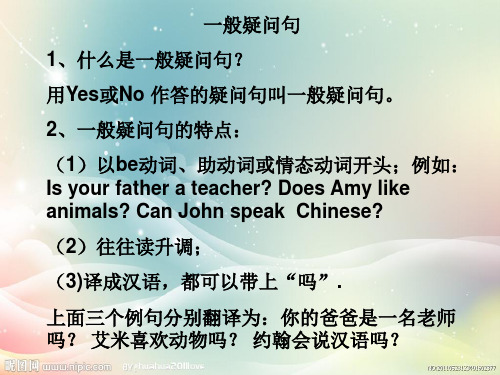
2、如果句中没有be动词、助动词或情态动词,则根据位于动词的 形式借助do的相应形式放在句首。具体方法是;如果谓语动词时原 形,则借do,如果谓语动词时一般现在时第三人称单数,则借助 does;如果谓语动词时过去式,则借助did。需要注意的是,借 does或是did后,原句的谓语动词要变回原形。 例:They go to school by bike.
注意:1、如果陈述句中有第一人称,变问句时最好变为第二人称。 例:I usually eat breakfast at home。
2、如果陈述句中有some ,变问句时往往要变成any。
通常回答为: 肯定:Yes,+主语+提问的助动词. 否定:No,+主语+提问的助动词+not. 如: Are you from Japan﹖ Yes I am. / No I'm not. Is her sister doing her homework now﹖ Yes she is. / No she isn't. Does he work in a bank﹖ Yes he does. / No he doesn't. Do you live near your school﹖ Yes I do. / No I don't. Can you speak French﹖ Yes I can. / No I can't.
一般疑问句

一般疑问句一、什么是一般疑问句用Yes或No作答的疑问句叫一般疑问句。
一般疑问句还有下列特点:1、以be动词、助动词或情态动词开头;例:Is your father a teacher? Does Catherine like animals?2、往往读升调;3、译成汉语,都可以带上“吗”,例如上面两句句可分别译为:你父亲是老师吗?凯瑟琳喜欢动物吗?二.例何将陈述句变成一般疑问句?要将陈述句变成一般疑问句,可以遵循下列步骤:1.看句中有没有be动词(am、is、are)、助动词(do、does)情态动词(can、may等),如果有,将其提到句首,句末打上问号即可。
例:It is rainy today. →Is it rainy today?Tom's father can play the piano→Can Tom's father play the piano?2.如果句中没有be动词、助动词或情态动词,则根据谓语动词的形式借助do的相应形式放在句首。
具体方法是:如果谓语动词是原形,则借do;如果谓语动词是一般现在时第三人称单数形式,则借does.记得助动词和情态动词后面接动词原形。
例:They go to school by bike. →Do they go to school by bike?三.陈述句变一般疑问句应注意的事项陈述句变成一般疑问句除了遵循上述规则以外,还应注意下点:1.如果陈述句中有第一人称,则变问句时最好要变为第二人称。
I usually have lunch at school→Do you usually have lunch at school?My father is playing soccer. →Is your father playing soccer?2.如果陈述句中有some, 则变问句时往往要变成any 。
There is some water on the playground. → Is there any water on the playground?四.一般疑问句的回答一般疑问句往往采用简短回答,共由三部分(三个单词)组成,对这三部分(三个单词)的确定可以概括例下:1.第一个词:不是Yes就是No。
一般疑问句
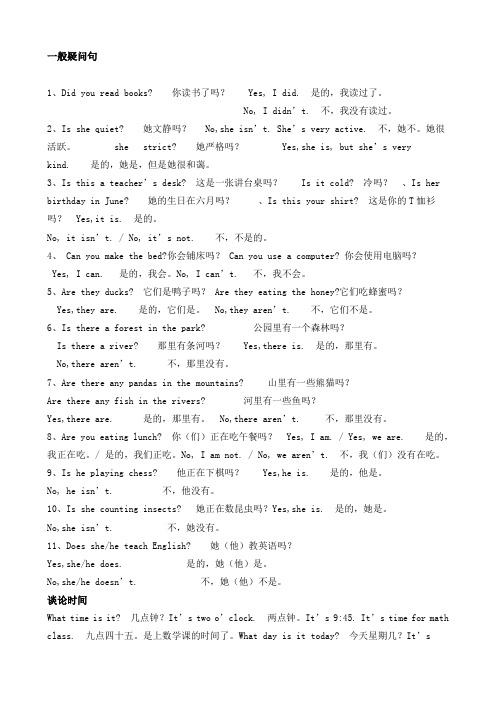
一般疑问句1、Did you read books? 你读书了吗?Yes, I did. 是的,我读过了。
No, I didn’t.不,我没有读过。
2、Is she quiet? 她文静吗?No,she isn’t. She’s very active.不,她不。
她很活跃。
she strict? 她严格吗?Yes,she is, but she’s verykind. 是的,她是,但是她很和蔼。
3、Is this a teacher’s de sk? 这是一张讲台桌吗?Is it cold? 冷吗?、Is her birthday in June? 她的生日在六月吗?、Is this your shirt? 这是你的T恤衫吗?Yes,it is. 是的。
No, it isn’t. / No, it’s not.不,不是的。
4、 Can you make the bed?你会铺床吗? Can you use a computer? 你会使用电脑吗?Yes, I can. 是的,我会。
No, I can’t.不,我不会。
5、Are they ducks? 它们是鸭子吗? Are they eating the honey?它们吃蜂蜜吗?Yes,they are. 是的,它们是。
No,they aren’t.不,它们不是。
6、Is there a forest in the park? 公园里有一个森林吗?Is there a river? 那里有条河吗?Yes,there is. 是的,那里有。
No,there aren’t.不,那里没有。
7、Are there any pandas in the mountains? 山里有一些熊猫吗?Are there any fish in the rivers? 河里有一些鱼吗?Yes,there are. 是的,那里有。
No,there aren’t.不,那里没有。
一般疑问句30个例句
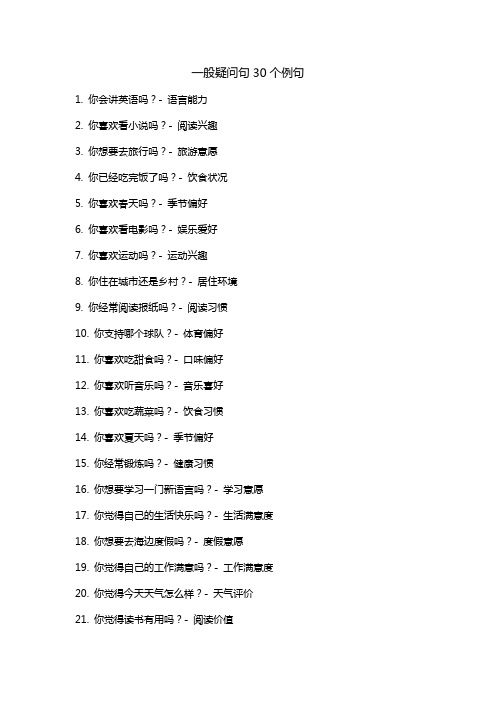
一般疑问句30个例句
1. 你会讲英语吗?- 语言能力
2. 你喜欢看小说吗?- 阅读兴趣
3. 你想要去旅行吗?- 旅游意愿
4. 你已经吃完饭了吗?- 饮食状况
5. 你喜欢春天吗?- 季节偏好
6. 你喜欢看电影吗?- 娱乐爱好
7. 你喜欢运动吗?- 运动兴趣
8. 你住在城市还是乡村?- 居住环境
9. 你经常阅读报纸吗?- 阅读习惯
10. 你支持哪个球队?- 体育偏好
11. 你喜欢吃甜食吗?- 口味偏好
12. 你喜欢听音乐吗?- 音乐喜好
13. 你喜欢吃蔬菜吗?- 饮食习惯
14. 你喜欢夏天吗?- 季节偏好
15. 你经常锻炼吗?- 健康习惯
16. 你想要学习一门新语言吗?- 学习意愿
17. 你觉得自己的生活快乐吗?- 生活满意度
18. 你想要去海边度假吗?- 度假意愿
19. 你觉得自己的工作满意吗?- 工作满意度
20. 你觉得今天天气怎么样?- 天气评价
21. 你觉得读书有用吗?- 阅读价值
22. 你经常逛街购物吗?- 购物习惯
23. 你想要养宠物吗?- 养宠物意愿
24. 你经常旅行吗?- 旅行频率
25. 你喜欢哪种颜色?- 颜色偏好
26. 你喜欢吃水果吗?- 饮食习惯
27. 你经常去健身房吗?- 健身频率
28. 你喜欢旅游吗?- 旅游兴趣
29. 你喜欢和朋友聚会吗?- 人际交往偏好
30. 你愿意参加志愿者活动吗?- 社会参与度。
一般疑问句
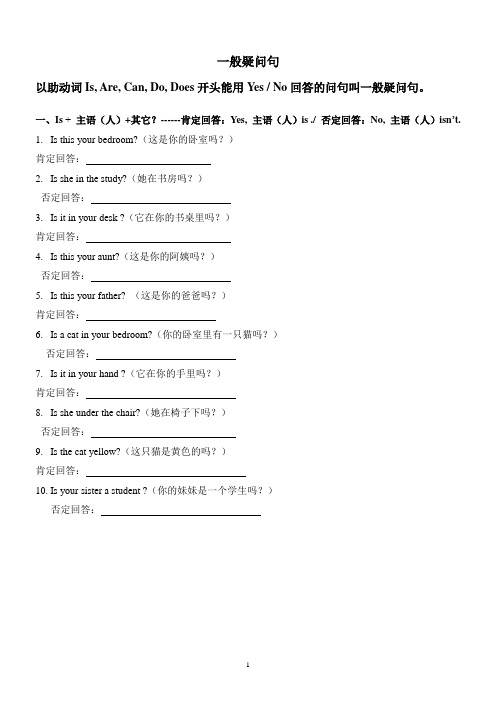
一般疑问句以助动词Is, Are, Can, Do, Does开头能用Yes / No回答的问句叫一般疑问句。
一、Is +主语(人)+其它?------肯定回答:Yes, 主语(人)is ./ 否定回答:No, 主语(人)isn’t.1.Is this your bedroom?(这是你的卧室吗?)肯定回答:2.Is she in the study?(她在书房吗?)否定回答:3.Is it in your desk ?(它在你的书桌里吗?)肯定回答:4.Is this your aunt?(这是你的阿姨吗?)否定回答:5.Is this your father? (这是你的爸爸吗?)肯定回答:6.Is a cat in your bedroom?(你的卧室里有一只猫吗?)否定回答:7.Is it in your hand ?(它在你的手里吗?)肯定回答:8.Is she under the chair?(她在椅子下吗?)否定回答:9.Is the cat yellow?(这只猫是黄色的吗?)肯定回答:10.Is your sister a student ?(你的妹妹是一个学生吗?)否定回答:二、Are + 主语(人)+其它?------肯定回答:Yes, 主语(人)are ./ 否定回答:No, 主语(人)aren’t.1.Are they on the table? (它们在桌子上吗?)肯定回答:2.Are they near the phone?(它个在电话上吗?)否定回答:3.Are they farmers?(他们是农民吗?)肯定回答:4.Are the pencils on the desk?(铅笔在书桌上吗?)否定回答:5.Are you a student?(你是一个学生吗?肯定回答:三、Can+ 主语(人)+其它?------肯定回答:Yes, 主语(人)can. /否定回答:No, 主语(人)can’t.1.Can you spell this words? (你会拼这些单词吗?)肯定回答否定回答:2.Can I have some noodles, please? (请问我能吃一些面条吗?)肯定回答:3.Mom, can I help?(妈妈,我能帮助你吗?)肯定回答:. 否定回答:四、Do + 主语(人)+其它?------肯定回答:Yes, 主语(人)do . /否定回答:No, 主语(人)don’t.1.Do you know?(你认识吗?)肯定:否定2.Do you like them? (你喜欢它们吗?)肯定回答:3.Do you have a computer in it? (你有一台电脑吗?)否定回答:4.Do you like your classroom?(你喜欢你的教室吗?)肯定回答:。
一般疑问句的定义
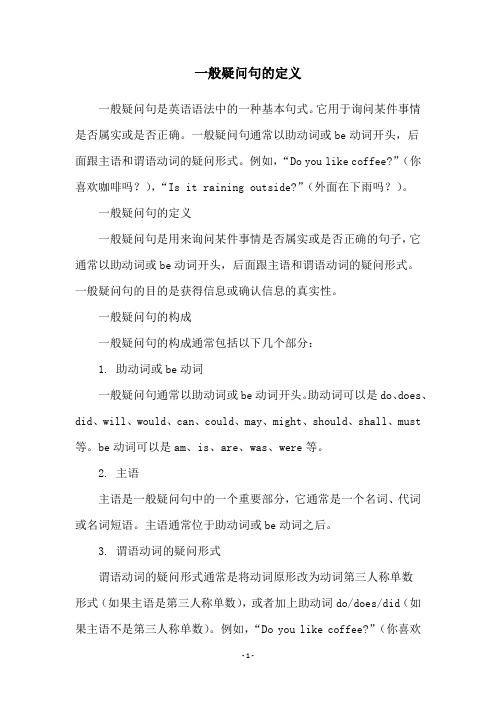
一般疑问句的定义一般疑问句是英语语法中的一种基本句式。
它用于询问某件事情是否属实或是否正确。
一般疑问句通常以助动词或be动词开头,后面跟主语和谓语动词的疑问形式。
例如,“Do you like coffee?”(你喜欢咖啡吗?),“Is it raining outside?”(外面在下雨吗?)。
一般疑问句的定义一般疑问句是用来询问某件事情是否属实或是否正确的句子,它通常以助动词或be动词开头,后面跟主语和谓语动词的疑问形式。
一般疑问句的目的是获得信息或确认信息的真实性。
一般疑问句的构成一般疑问句的构成通常包括以下几个部分:1. 助动词或be动词一般疑问句通常以助动词或be动词开头。
助动词可以是do、does、did、will、would、can、could、may、might、should、shall、must 等。
be动词可以是am、is、are、was、were等。
2. 主语主语是一般疑问句中的一个重要部分,它通常是一个名词、代词或名词短语。
主语通常位于助动词或be动词之后。
3. 谓语动词的疑问形式谓语动词的疑问形式通常是将动词原形改为动词第三人称单数形式(如果主语是第三人称单数),或者加上助动词do/does/did(如果主语不是第三人称单数)。
例如,“Do you like coffee?”(你喜欢咖啡吗?),“Does he like coffee?”(他喜欢咖啡吗?)。
一般疑问句的回答一般疑问句的回答通常是“yes”或“no”。
如果回答是“yes”,通常需要加上肯定的理由或解释。
如果回答是“no”,通常需要加上否定的理由或解释。
例如,“Do you like coffee?”(你喜欢咖啡吗?),“Yes, I do. It's my favorite drink.”(是的,我喜欢。
它是我最喜欢的饮料。
),“No, I don't. I prefer tea.”(不,我不喜欢。
疑问句大全――_一般疑问句
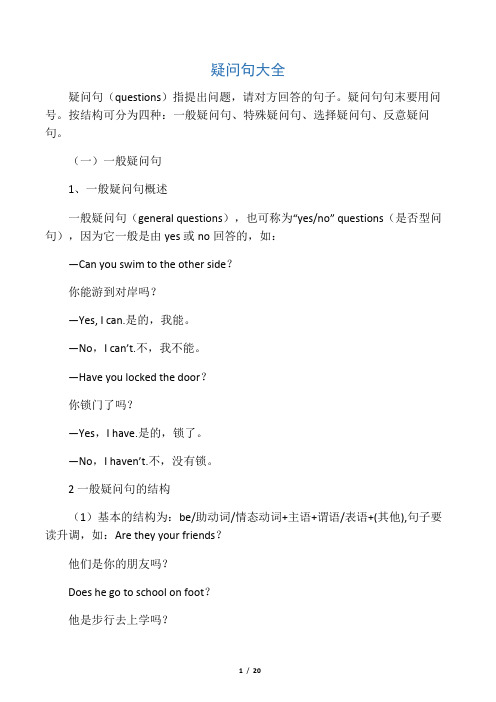
疑问句大全疑问句(questions)指提出问题,请对方回答的句子。
疑问句句末要用问号。
按结构可分为四种:一般疑问句、特殊疑问句、选择疑问句、反意疑问句。
(一)一般疑问句1、一般疑问句概述一般疑问句(general questions),也可称为“yes/no” questions(是否型问句),因为它一般是由yes或no回答的,如:—Can you swim to the other side?你能游到对岸吗?—Yes, I can.是的,我能。
—No,I can’t.不,我不能。
—Have you locked the door?你锁门了吗?—Yes,I have.是的,锁了。
—No,I haven’t.不,没有锁。
2一般疑问句的结构(1)基本的结构为:be/助动词/情态动词+主语+谓语/表语+(其他),句子要读升调,如:Are they your friends?他们是你的朋友吗?Does he go to school on foot?他是步行去上学吗?Will you be free tonight?你今晚有空吗?Can you play basketball?你会打篮球吗?(2)陈述句亦可用作一般疑问句,多用在非正式文体中,句末有问号,用升调,如:Somebody is with you?有人和你一起吗?He didn’t finish the work?他没有做完活吗?3、一般疑问句的答语(1)一般疑问句一般由yes或no来回答,如:—Are you tired?你累了吗?—Yes,I am.是的,累了。
—No, I’mnot.不,不累。
—Does she do the cleaning?她扫除了吗?—Yes,she does.是的,她打扫了。
—No,she doesn’t.不,她没打扫。
2)回答一般疑问句除了用yes或no外,也可用certainly,probably,perhaps,of course,all right,with pleasure等代替yes,用never,not at all等代替no,如:—Can you help me?你能帮个忙吗?—Certainly.当然。
- 1、下载文档前请自行甄别文档内容的完整性,平台不提供额外的编辑、内容补充、找答案等附加服务。
- 2、"仅部分预览"的文档,不可在线预览部分如存在完整性等问题,可反馈申请退款(可完整预览的文档不适用该条件!)。
- 3、如文档侵犯您的权益,请联系客服反馈,我们会尽快为您处理(人工客服工作时间:9:00-18:30)。
疑问句是英语中最常见的句式,它可以分为:一般疑问句,特殊疑问句,选择疑问句,反意疑问句四种。
一般疑问句:Is she from America?
特殊疑问句:When is your birthday?
选择疑问句:is this a dog or a cat?
反意疑问句:you are a student?
------------------------
一般疑问句:
结构是be动词/情态动词/助动词/+主语+其他成分。
用yes 或no回答的疑问句,称为一般疑问句。
这种疑问句句尾多用升调,句末用问号?。
------------------------------------------
1.be动词的一般疑问句
陈述句中有be动词时,可以直接将它们提至主语前,即构成一般疑问。
句型:be动词+主语+····?
A:Is he your close friend?
B:Yes ,he is .
B:No he isn't
A:Is there any drinks in the ring-pull can?
A:Yes there is
B:No there isn't
A:Are there any birds in the sky?
A:Yes there are
B:No there aren't
A:Were the babies crying last night?
B:Yes there were.
B:No they weren't
A:Is english spoken all over the world?
B:Yes it is
B:No it isn't
I am in Class 2Grade1
Are you in class 2Grade 1?
We are watching TV.
Are you watching TV?
2.情态动词的一般疑问句
陈述句中有情态动词时,可以直接将它们提至主语前,即构成一般疑问句。
情态动词+主语+动词原形+····?
A:Can you bring me some lemons?
B:Yes i can
B:No i can't
A:Must i do now ?
B:Yes you must.
B:No you needn't
He can swim now.
Can he swim now?
The children may come with us.
May the children come with us?
一些情态动词构成的一般疑问句,在形式上是问句,但他表达的是请求,建议等,语气委婉。
情态动词表示请求:
Can/could you carry the heavy box for me ?
Will/would you please give me some butter?
May i have some more rice?
情态动词表示邀请,建议
Will you visit the museum next?
Would like to go with us ?
Shall we go swimming?
3.行为动词的一般疑问句
陈述句中只有行为动词时,一般疑问句要在句首加助动词do,does,did.
Do/does/did+主语+动词原形+····?
A:Does he have supper at home every day?
B:Yes he does.
B:No he doesn't
A:Did he do morning exercises yesterday?
B:Yes he did .
B:No he didn't
I like these animals.
Do you like these animals?
She wants to go to the movies.
Does she want to go to the movies?
4.现在完成时和过去完成时的一般疑问句。
完成时一般疑问句要把助动词have has had 提到句首。
Have/ has /had +主语+动词过去分词+····?
Have you know her since your childhood?
Yes,i have .
No i haven't
Had he learned about two thousand english words before he came here? Yes he had
No he hadn't。
